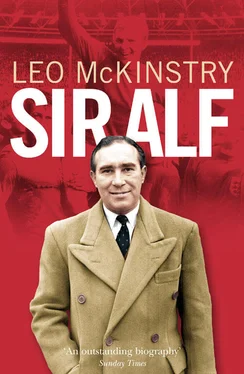1 ...7 8 9 11 12 13 ...28 ‘So who was that then?’
And he replied in that voice of his, ‘I have never seen him before in my life.’
It was the change in Alf’s voice that most graphically reflected his journey away from Dagenham. Terry Venables, like several other footballers from the same area, including Jimmy Greaves and Bobby Moore, always retained the accent of his youth. But Alf dropped his, developing in its place a kind of strangulated parody of a minor public-school housemaster. The new intonation was never convincing, partly because Alf was a shy man, who was without natural articulacy and could be painfully self-conscious in public, and partly because his limited education meant that he lacked a wide vocabulary and a mastery of syntax. Hugh McIlvanney says:
Alf made it hard for some of us to like him because of the shame he seemed to feel about his background. We all understand there can be pressures in those areas but the voice was nothing short of ludicrous. There were some words he could not pronounce and the grammar kept going for a walk. That could be a problem for any human being but, for Alf, it almost became a caricature.
In his gauche attempts to sound authoritative, particularly in front of the cameras or the microphone, Alf would become stilted and awkward, littering statements with platitudes and empty qualifying sub-clauses. One extreme example of this occurred when he was being interviewed on BBC Radio in the early sixties:
‘Are you parents still alive, Mr Ramsey?’
‘Oh, yes.’
‘Where do they live?’
‘In Dagenham, I believe.’
In his 1970 biography, when Ramsey was still England manager, Max Marquis gave a vivid description of Alf’s style. Describing his language as ‘obscure and tautological’, Marquis said that Ramsey
is unable to communicate with any precision what he means because he will never use a single-syllable word when an inappropriate two-syllable word will do and he dots his phrases with some strange, meaningless interjections…His tangled prose, allied with his capacity for self-persuasion, has made for some of his quite baffling pronouncements. In public he lets words go reluctantly through a tightly controlled mouth: his eyes move uneasily.
Because Ramsey never felt in command of his language, he could vary wildly between triteness and controversy. He could be absurdly unemotional, as when Ipswich won the League title in 1962, perhaps the most astonishing and romantic feat in the history of English club football.
‘How do you feel, Mr Ramsey?’ said a breathless BBC reporter, having described him as ‘the architect of this miracle’.
‘I feel fine,’ replied Ramsey, as if he had done nothing more than pour himself a cup of tea.
Yet this was also the man who created a rod for his own back through a series of inflammatory statements, like his notorious description of the 1966 Argentinian team as ‘animals’ or his claim in 1970 that English football had ‘nothing to learn’ from the Brazilians. As Max Marquis put it, ‘Ramsey is like a bad gunner who shoots over or short of the target.’
A serious-minded youth, always striving for some kind of respectability, Alf did not have as strong a working-class accent as some of his contemporaries. Nevertheless, his speech could not help but be influenced by his surroundings. ‘Dagenham had its own special brogue, and Alf spoke with that,’ says Phil Cairns, ‘It was a sort of bastardized cockney. He certainly had that accent as a child. I did notice how his voice changed when he got on in life. It was so obvious. When he had a long conversation, you would hear that he made faux pas.’ Eddie Baily, who was Alf’s closest friend at Spurs, told me of the difference he saw in Alf once he had gone into management with Ipswich Town:
He was cockney to me but I noticed his voice changed after he left Tottenham. When I saw him after that, his voice was refined. I would say to him, ‘What are you doing? Where did all this come from? You’re speaking very well, my old soldier.’ He would just laugh at that. I could always have a go at him. But I think the position that he took made him want to be a little bit better when he had to do negotiations and all that.
It has always been alleged that this distinct change in Alf Ramsey’s voice was as a result of his taking elocution lessons in the mid-fifties. Indeed, the idea of Alf’s elocution lessons has become more than just part of football folklore: it is now treated as a fact. Both Ramsey’s previous biographers, Max Marquis and Dave Bowler, state without any reservation that he underwent such instruction. The late John Eastwood, who wrote a massively authoritative history of Ipswich football, reported that ‘it was well known that Alf took himself off for the two-hour elocution lessons to a woman at the ballroom dancing school near Barrack Corner in Ipswich’. Another, far less believable, version has been put forward by Rodney Marsh, the charismatic striker of the seventies and later Sky TV presenter, who has claimed that Ramsey took ‘elocution lessons, paid for by the FA, around the time of the World Cup in 1966’. Anyone who knew about either the parsimony of the FA or Alf’s contempt for the Association’s councillors would know that this assertion was nonsense.
Yet the absurdity of Marsh’s statement only exposes the weakness of the conventional wisdom that Alf underwent elocution training. The fact is that ever since his youth, Alf was on a mission to improve himself – and a key element of that was to change his speaking voice, adopting the received pronunciation he heard from BBC broadcasters on the wireless, from officers in the army and from directors at League clubs. There was nothing reprehensible about this. Before the mid-sixties, working-class boys of ambition were encouraged to believe that retaining their accents could be a barrier to progress in their careers. Edward Heath, the son of a Broad-stairs carpenter, adopted the elevated tones of Oxford before embarking on his rise to the top of the Conservative party.
With Alf there was no sudden dramatic switch in his voice from ‘Cor Blimey’ Dagenham to his imitation of the plummy vowels of the establishment; rather it was a gradual process, beginning in his teenage years and climaxing when he became manager of Ipswich. Over a long period his accent, never the strongest, grew milder until it was subsumed within his precise, artificial style of speech. From his earliest years as a professional footballer in the 1940s, Alf was seeking to improve himself in manner and appearance.
Stan Clements, who was training to become a civil engineer when he knew Alf at Southampton and was therefore more socially perceptive than most footballers of the time, says:
I always thought all those stories about his having elocution lessons were a load of old codswallop. His voice had a slight accent but it was controlled. It was not cockney but Essex. I would have said that when he was in the army and became a sergeant – and in those days there was a big difference in class between non-commissioned staff and the officers – he would have got to know the officers and there is no doubt that this influenced his speech.
Other Southampton contemporaries of the 1940s back up Clements. Pat Millward, whose husband Doug played for the Saints and then under Alf at Ipswich, recalls: ‘Alf always spoke very nicely, even at Southampton. He did not use slang much, unlike the others. I’m sure he never had elocution lessons.’ Eric Day, who played up front for the Saints, agrees: ‘He was so taciturn, self-effacing. He always spoke in that very clipped sort of way. He thought his words out before he spoke them.’ Mary Bates, who worked at the Southampton FC office during Alf’s time, makes this interesting point: ‘Even during his time at Southampton, his voice changed, not noticeably at first but certainly there was a difference. If I look back from 1949 to 1945, there was a marked change.’
Читать дальше












